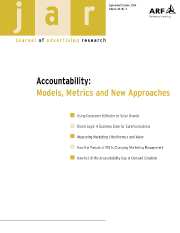Article contents
Editorial: The Fragile Nature of Corporate Reputation
Published online by Cambridge University Press: 24 February 2006
Extract
Most large corporations in America for decades assumed they were respected and trusted as good citizens by their employees and the public. The primary focus of management, therefore, had been on producing and selling their goods and services at a profit attractive to shareholders. This has been the primary focus of marketing and marketing communications as well. Efforts to build a strong, positive corporate reputation have been the province of public relations or low on the priority list while everything else focuses on transactions. A few companies like General Electric, DuPont, Toyota, McDonalds, and BP created memorable corporate efforts.
- Type
- EDITORIAL
- Information
- Copyright
- © Copyright © 1960-2005, The ARF
Most large corporations in America for decades assumed they were respected and trusted as good citizens by their employees and the public. The primary focus of management, therefore, had been on producing and selling their goods and services at a profit attractive to shareholders. This has been the primary focus of marketing and marketing communications as well. Efforts to build a strong, positive corporate reputation have been the province of public relations or low on the priority list while everything else focuses on transactions. A few companies like General Electric, DuPont, Toyota, McDonalds, and BP created memorable corporate efforts.

The past decade has changed everything! Beginning with the dotcom bust, the Enron scandal, and a continuing series of corporate missteps of every imaginable kind, corporations in America have suffered a huge loss in public trust and credibility.
At the same time, access to a range of news, information, and opinions via the internet, along with corporate missteps, has put a priority on the need to build a strong, positive corporate reputation. It usually begins with an internal and external understanding of how the corporation is perceived and then audits conducted on corporate social responsibility programs to determine the degree of good corporate citizenship. Research on corporate equity as well as brand equity has emerged as a discipline. Corporate sponsorship, long considered a stepchild or afterthought, is now a major strategic effort at many companies. Strategy questions of portfolio management clearly involve the best way to leverage the corporate brand and its reputation. Grass roots programs involving employees and partners are happening on a global scale. The reputation of the United States itself, which has suffered in recent years, as pointed out by an article from Simon Anholt in this issue, has gained in importance to management. The leadership perceptions, values, and visions of corporate management are constantly under public scrutiny. A company's reputation is no longer taken for granted or considered an afterthought to selling products and services.
This issue of the JAR looks at the many sides of building and maintaining a strong, positive reputation. I have asked Lou Capozzi, chairman of Publicis Groupe Public Relations, to share his personal vision of the increasing importance of corporate reputation and how critical measurement of effectiveness has become in order to help corporations succeed. Hopefully, the fine collection of articles in this issue will provide you with new ideas for research and learning about ways to build your company's reputation or a chance to re-evaluate your company effort (in thoughts and deeds) to build a strong, positive reputation. Without one, sales will become an afterthought.
- 1
- Cited by




